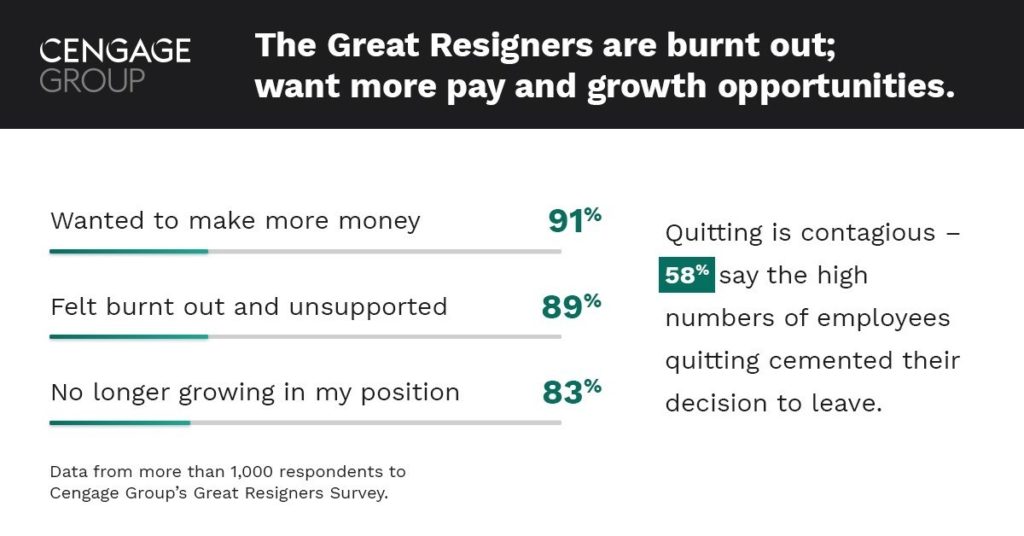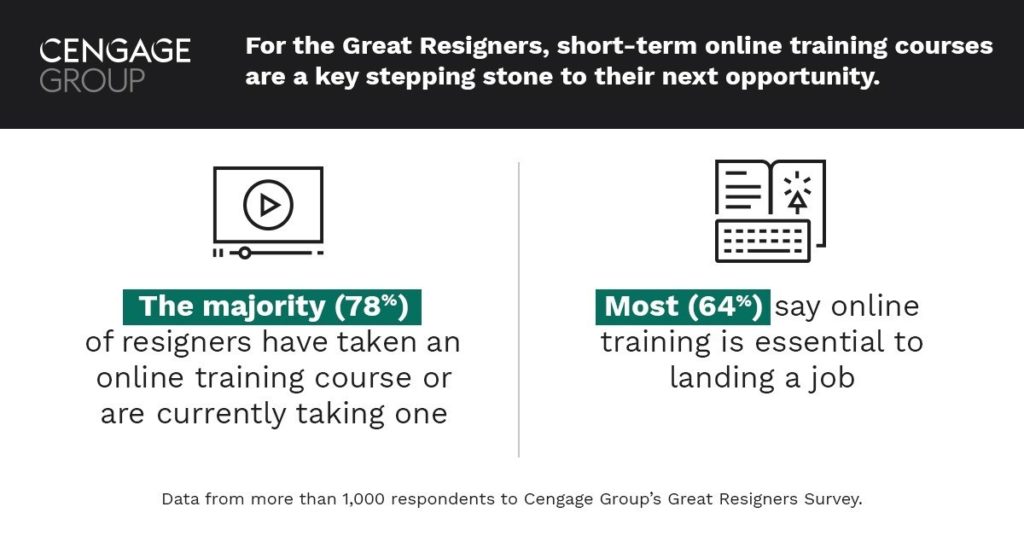Employee burnout, stalled career progress and pay are the main drivers of The Great Resignation, according to new research.
The “great resigners” are burnt out; want more pay and growth opportunities, confirmed the study from global education tech firm Cengage Group. Employee resignations are at an all-time high. In the US alone nearly 40 million workers have resigned from their positions during 2021 as part of “The Great Resignation.” Resigners are evaluating their priorities; and choosing to walk away from their jobs in search of better pay, relief from burn out and looking to combat stagnant careers.
Many resigners are willing to be out of work while they look for a new position; and they see online training courses giving them an advantage in the job search process, according to the research. The majority of “great resigners” are turning to online training courses to get a leg up in the job search process.
“The research is clear; while the pandemic has caused stress and grief for millions, at the same time, the disruption of the past two years provided space for workers to evaluate and assess their priorities and their options. Millions of workers are changing how they think about work, their purpose and the impact of their careers,” commented Michael E Hansen, CEO of Cengage Group.

TOP REASONS FOR QUITTING
The report surveyed 1,200 US adults across industries who had either quit their jobs, or were seriously planning to, in the last six months. Key findings from the research, entitled The Great Resignation to the Great Reskilling: Insight on What’s Next for the Great Resigners, revealed that:
- Workers are burnt out and want more pay. They are willing to make personal sacrifices to get a new lease on their professional lives. In fact, 71% said they had to or would have to be out of work in between jobs. While there are many factors at play, the top cited reasons for quitting were:
- Wanting to make more money (91%).
- Feeling burnt out and unsupported (89%).
- No longer feeling like I am growing in my position (83%).
- Online training is a stepping stone to resigners’ next opportunities; and their sights are set on three industries. Nearly four out of five resigners (78%) have completed or are currently enrolled in an online training course or certificate programme. And their motivations are clear; 64% say that having an online training programme on their resume is essential to landing a new job.
- The most popular industries to reskill or upskill into are:
- Finance & Insurance (24%)
- Technology (24%)
- Healthcare (20%)
- The most popular industries to reskill or upskill into are:
- Employers must prioritise professional development and benefits or risk more employee resignations. Many resigners left their jobs in part because of a lack of professional development opportunities; and feeling like they were no longer growing in their positions. Not surprisingly, the most important attributes of resigners’ next roles are good benefits (33%); better pay (23%); but also clear opportunities for professional growth (22%). Quitting is contagious. More than half of resigners (58%) said that the high number of employees quitting cemented their decision to leave, too.

FINDING & RETAINING QUALIFIED STAFF
“Our growing workforce skills business has had a front-row seat to these shifts in the workforce, helping adults access upskilling and reskilling opportunities in order to secure meaningful jobs that provide opportunities for better pay, accommodating schedules and career growth. At the same time companies are struggling to find and retain qualified workers,” Hansen said. “As millions reconsider what is important to them – in life and in their next job – there is an opportunity for employers to reconsider how they support employees’ wellbeing and professional growth; both to recruit new talent and retain existing employees. As the CEO of a global company, I’m acutely aware of the opportunity we have to evaluate our hiring practices; and expand learning and development opportunities for employees.”
You can download the full report “From The Great Resignation to the Great Reskilling: Insight on What’s Next for the Great Resigners” here.








































